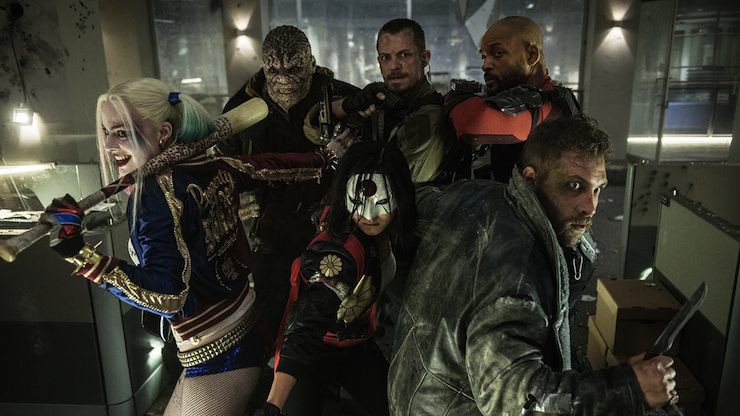After the critical bomb that was Batman v Superman, DC was counting on Suicide Squad to help them save face, going so far as to send the film back into reshoots with rumors of lightening the tone. (It’s important to note that these rumors have not been substantiated, with most of the cast saying that they went back to film more action sequences.) But it seems doubtful that any amount of finicking could have saved Suicide Squad, a film that uses its “dark” content as an excuse to insult its audience’s intelligence on practically every level.
Spoilers for all of Suicide Squad.
But is it fun? Well, if you can ignore the blatant stereotypes and ham-fisted dialogue, perhaps. Also if you can ignore the film’s dismal view of women. And its soundtrack. Then there’s the plot that couldn’t rub two sticks together to create a fire that roasts marshmallows, let alone provide real heat. Also, a failure to create an ensemble of any kind, as the movie really only cares about the journey of two characters. And the strangest use of the Joker in any film to date. I could go on.
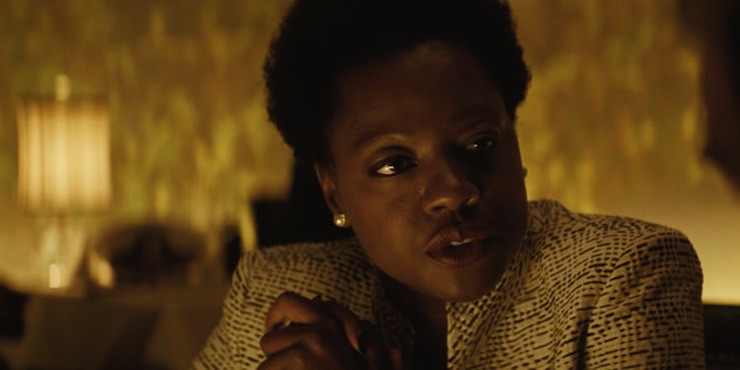
At least Viola Davis seems to be having a great time playing Amanda Waller?
Creating a film that relies on villains to perform heroic acts sounds like a license to print various currencies. Fans love to care about bad guys; it gives us all an excuse to tap into our meaner thoughts and desires, to indulge in ambiguity—and good antagonists have a tendency to be witty and sharp. That being said, it is possible to allow your audience to empathize with bad people while still allowing those characters a modicum of dignity or intrigue. Which none of the characters in Suicide Squad have.
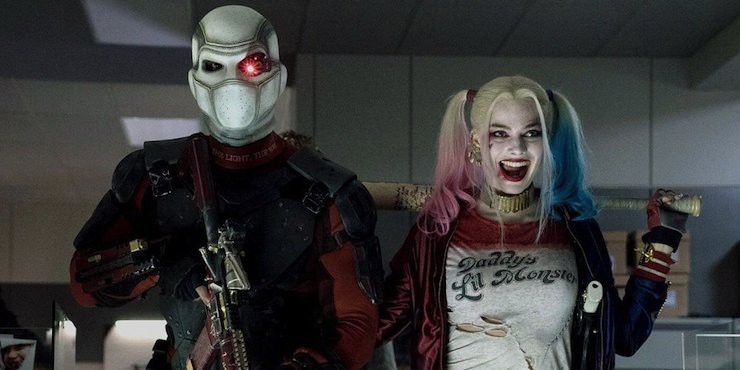
The film primarily concerns itself with two members of the crew: Deadshot (Will Smith) and Harley Quinn (Margot Robbie). It makes the rare moments when we’re supposed to worry about the whole team baffling because no character work is done for any of them. (With the exception of Jay Hernandez’s El Diablo, whose backstory is a playground of tired racial stereotypes, though he gives his all.) We know that we’re supposed to care about them as a team because they start using words like “friends” and “family” in relation to one another, which is catch-all movie speak for we’re a group now, please get invested in us because we care. Other team-up films typically don’t need to be so obvious about it, but Suicide Squad does, because it’s never made clear precisely when they start seeing each other as pals and equals. (It’s probably supposed to be when they’re all drinking together in an abandoned bar because nothing says “we like each other” like shared alcoholism.)
Deadshot is liable to confuse fans of the comics, as he barely resembles Floyd Lawton on the page; the movie takes a tiny snippet of his character—the part where he has a daughter, so we feel bad for the guy when he wants to take care of her—and drapes Will Smith’s usual swagger over top to give him leading man charm. Despite the departure, Smith’s humor is something that the film desperately requires—but even his occasional one-liner can’t save the movie from being depressing for the wrong reasons. The concept of Suicide Squad should be fascinating because Amanda Waller’s idea to create Task Force X is deeply unethical and dangerous. But the film veers away from asking any of the hard questions where the creation of such a team is concerned, and instead suggests that we should be sad because all these villains want is to be “normal”… and they just can’t manage it. (Why they can’t is largely a mystery, as the only people who truly have no say in their lot are Diablo and Killer Croc. It’s also unclear if all of them truly do wish they were normal, but Harley shouts about it, so it’s clearly meant to be the crux of the film’s emotional arc.)
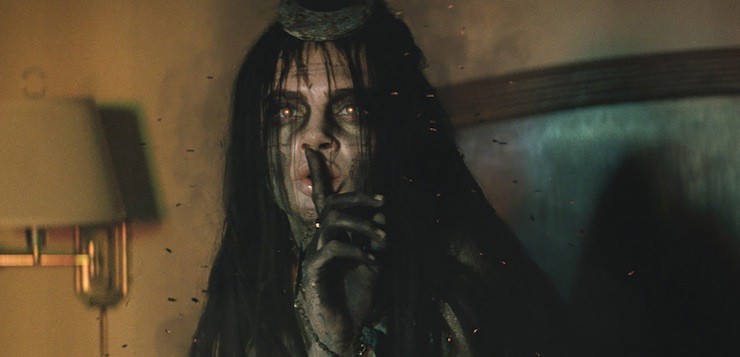
While Suicide Squad has the benefit of being one of the more diverse super-people films that audiences have ever seen, that doesn’t prevent it from being offensive on practically every front where that inclusivity is concerned. Slipknot (Adam Beach), who appears to be the only First Nations actor to play a super-powered comics character on the big screen, manages to punch a female guard in the face for no reason on his introduction, then abruptly dies two minutes in their mission. Killer Croc (Adewale Akinnouye-Agbaje) says practically nothing through the entirety of the film, only to request B.E.T. on television in his prison cell at the end, because that was as much personality as the movie felt capable of allowing him. El Diablo is a former L.A. gang member whose emotions prompt him to lose control of his powers, leading to the murder of his wife and kids. Karen Fukuhara’s Katana is one of the good guys, but barely speaks a word—all we learn about her is that her husband’s soul is trapped in the sword that she wields, and that she’s great at fighting. Because the true villain of the story—Enchantress—has possessed the body of archaeologist June Moone, the movie gets away with having white-as-snow Cara Delevingne play the part of an ancient South American witch.
While the film treats all of its female characters with varying levels of disdain and/or outright misogyny, Harley Quinn is perhaps the most obvious because she gets the most attention. Fans of the character know of her origin as the Joker’s psychiatrist at Arkham Asylum, who has her own script flipped on her, and winds up becoming the Joker’s harlequin girlfriend instead. But while Harley’s tale typically suggested that Dr. Quinzel was only in need of an excuse to become Harley Quinn, Suicide Squad goes out of its way to suggest that the Joker forced insanity on her by giving her electric shock treatments. Batman shows up in flashbacks to haul Harley in to Belle Reve prison, but ends up having to fish her out of the water when the Joker drives their car off a bridge and into a river. Batman tries to give Harley mouth-to-mouth, then puts his hands around her throat when she abruptly comes to and tries to punch him, making her treatment overtly sexual even where a protagonist like Batman is concerned.
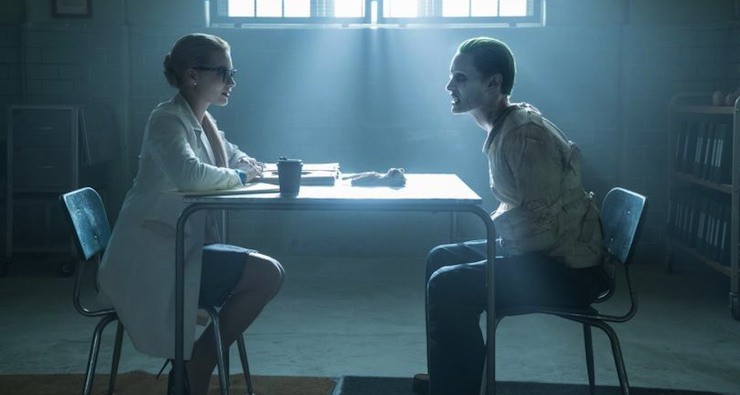
The Joker is depicted as Harley’s prince charming (he comes to “rescue” her repeatedly, at one point he wakes her with a kiss), but speaks about her like his obedient sex object. The film’s visual vernacular only makes this worse, framing Quinn with a decidedly pornographic flare, tracking her body—or body parts—over her face every time. In an interview with HitFix writer-director David Ayer claimed that this made sense using that age-old sex-is-a-weapon-too excuse: “[S]peaking about Harlequin specifically, is there’s a sexuality, there’s an attractiveness, but when you understand how that character thinks, she almost uses that as a weapon to disarm people. Kind of as a visual judo to get what she wants. That’s a big part of how Margot is playing the role. I think it’s, there’s an intrinsic sort of awareness that that’s part of her game.” In Harley’s only one-on-one fight scene in the entire film, K7’s “Come Baby Come” plays in the background, because even when Quinn is kicking your ass, you should be thinking about sleeping with her.
By the by, the film revels in exec producer Zack Snyder’s penchant for on-the-nose song selection, to the point of sheer idiocy. The whole movie starts on The Animals’ “House of the Rising Sun” as we watch Deadshot smacking around a punching bag in his prison cell at Belle Reve. (Belle Reve prison is supposed to be in Louisiana and the House of the Rising Sun is in New Orleans, which is also in Louisiana! It’s like they’re twins! Right?) Then we move onto Quinn, who’s hanging from the bars of her cell while Lesley Gore croons “You Don’t Own Me.” (A guard immediately comes in to tell her what to do, and Quinn refuses because you don’t own her, get it? Only the Joker does, as you can see by the bomber jacket she later slips on that prominently displays the words “Property of the Joker.” Duh.) The film then jumps to Amanda Waller and “Sympathy for the Devil” begins, despite the fact that this particular piece of the Rolling Stones repertoire should have been retired from film and television about twenty years ago. (Please. Please just stop. Stop it.)
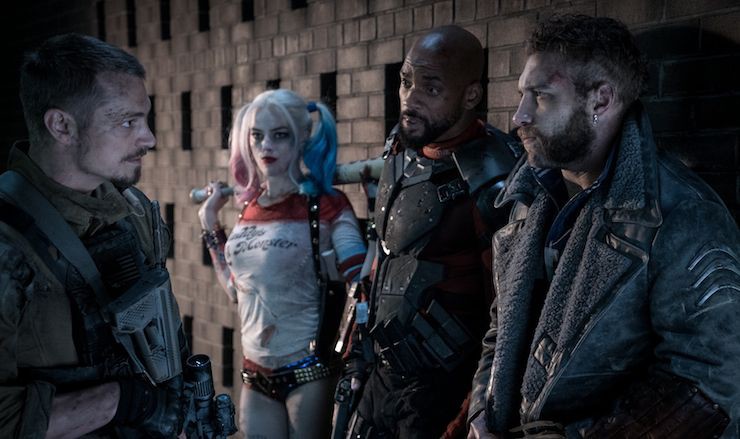
All in all, the film is excessively boring in its predictability. The characters not previously mentioned here—namely Jai Courtney’s Captain Boomerang and Joel Kinnaman’s Rick Flag—are so tepid that their lack of personalities become a kind of black hole that only adds to this problem. There was potential, certainly; if the film had managed to focus in on the budding friendship between Harley and Deadshot (the only man in the entire film who seems to think of her as a person, first and foremost), then there might have been some potential for interest going forward. As is, there’s a generic bad-guy fight at the end, the squad saves the city, and we’re not really encouraged to think about what they’ve accomplished as a group or otherwise.
That’s strike two for DC’s upcoming roster, it would seem. Though it sounds a cliché to point out that it’s down to Wonder Woman to save the day… it actually is.
So here’s hoping. *cues up “Under Pressure”*
…did I do it right?
Emmet Asher-Perrin just wants a film starring Harley and Poison Ivy and everything else can go away, thanks. You can bug her on Twitter and Tumblr, and read more of her work here and elsewhere.










